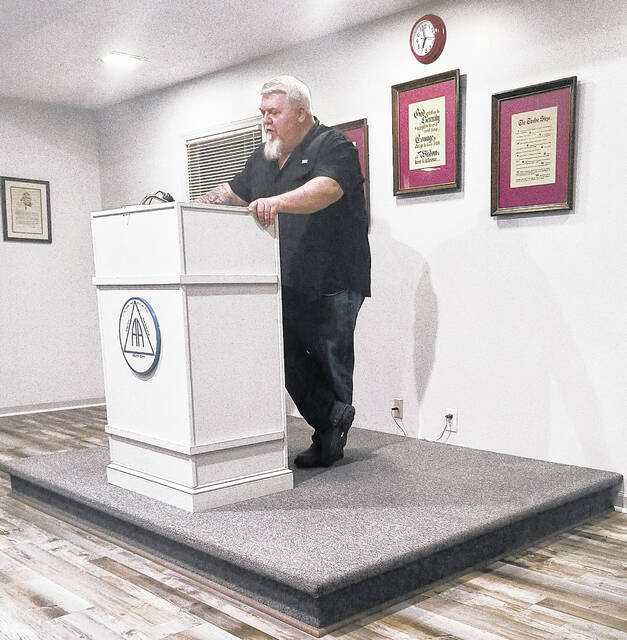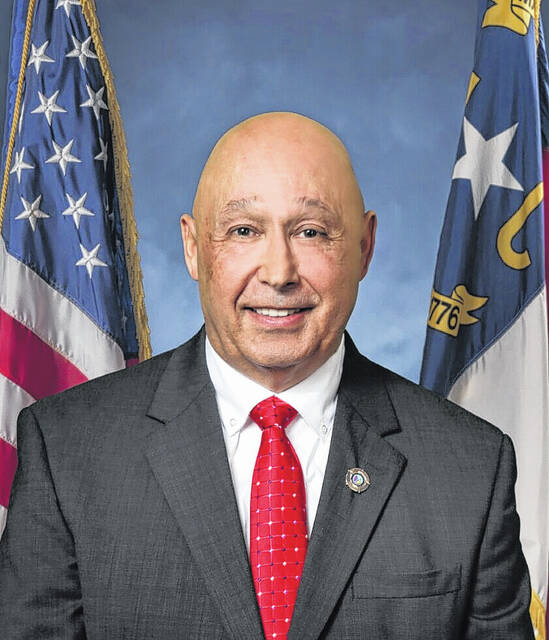ANSON COUNTY — Founder of Community Addiction and Awareness, William “Boogie” Short has been holding meetings since March 2024, initially in the little AA building, now in the Community Room at Atrium Anson, the fourth Tuesday of every month at 7 p.m.
This month, Short is planning a special meeting with the goal of reaching those who want to learn how the community can begin to heal by addressing how drug use and addiction relate to crime. Short is hopeful his July 22, 7 p.m. meeting in the Community Room at Atrium Anson will make deep inroads into bringing Ansonians together on this issue as it is a personal one for him as a former addict, and one he sees affecting the community he loves through his work raising awareness about and giving away Narcan, as a member of the Anson County Opioid Committee, and through his work as a mentor with Community Addiction and Awareness.
He explains, “I had a vision to start these meetings because I want people to be aware there is a lot more drug activity, and issues related to drug use going on in the community than most are aware of.” Short adds, “There is some great recovery going on in the community also, but to continue reaching addicts where they are, we need to be able to cover all spectrum of recovery, including the toll on family members and other loved ones.”
He wants anyone dealing with an addict or desiring recovery to know his group offers support and can connect individuals with the resources needed to get themselves back on track in life.
Because Short passionately believes crime and drug abuse often go together, he says he anticipates a community-oriented format like his special July meeting is geared towards, will go a long way towards educating the community, and erasing the stigma he thinks many have against attending meetings.
He says, “Meetings are not just for addicts, or any kind of anonymous type program. We are open to everyone in the community- whether you are struggling, know someone who is, or just want to be informed and educated about a serious issue claiming the lives of our fellow neighbors and friends- often silently.”
Short says it has been his experience drug abuse is often associated with domestic violence.
“Domestic violence goes hand in hand with drugs\alcohol issues in some way, shape, or form. I think drugs go along with a lot of your theft, breaking and entering and violent crimes. It may not be over the drug, per say, but normal people don’t walk around with guns living a gang life, there’s drugs involved somewhere, in my opinion,” explains Short.
He adds, “I think it’s very easy for someone to become addicted, people don’t realize how quick it can happen, especially if someone has an addictive personality. Addiction comes in many shapes and sizes, but I’m not a believer if someone uses something one time, they become addicted, unless they have an addictive personality, or gene.”
Short says he is unsure if drug use is related to the recent crime wave, or if it is solely related to the summers long heat wave, but he is willing to bet it is a factor.
He explains, “I don’t think drug use or sales is a part of the uptick in crime or violence, but I do think it’s involved, if only indirectly.”
Right now, Short feels fentanyl is the most dangerous drug Anson County is dealing with.
He says, “Yes, we have it here, and yes, it’s out there. People right here in Anson County are overdosing on it regularly, may not be dying, but overdosing all the same.”
Another drug Short says he knows is prevalent within the county is “horse tranquilizer,” or fentanyl mixed with xylazine. It is also known by its street name Tranq. Short confides his friend overdosed on a fentanyl and xylazine mixture in Richmond County about a year ago.
Short is a former addict and it breaks his heart to see people suffering in the place he used to be- trapped by his need to chase the next high.
He shares, “You are talking about women who will prostitute themselves for the drug they need. Mothers’ and fathers’ loose custody of their children over drugs, it is that powerful. No one wants to lose custody of their kids; the drug just has that much control.”
Despite being blessed with two beautiful daughters, Short says when he was at his worst, he still struggled to stay clean the three months needed for him to pass a hair follicle drug test.
He remembers, “I would get close and then get high again. From the outside looking in, I’m sure it seemed like I woke up every day and said to myself, “Yep, to hell with my kids, I’m going to get high again today. But it was the complete opposite- I would hate myself for it but still get high. Addiction has a control, a hold over people, that non-addicts have a hard time understanding.”
Sheriff Scott Howell agrees with a lot of Short’s observations.
He says “I think drug use is a big factor on crimes occurring in Anson County. 75% of our inmates who have a mental health problem were dependent on or abused alcohol or drugs.”
According to numbers released by the ACSO, approximately 75% of offenders arrested for property crimes like breaking or entering and larcenies in Anson County are drug offenders going through the court system and have committed their crimes to get money to buy drugs. 50% of offenders convicted of robbery, weapons violations, burglary, or motor vehicle theft most likely were using drugs at the time they committed the offenses.
Howell says, “Domestic violence, damage to property, simple assaults, breaking and entering, larcenies and homicides probably trend in the same approximate percentages I think as well.”
Particularly worrying to the Sheriff is the increase in drug use, specifically marijuana, among increasingly younger ages of Anson County youth.
He says, “A larger amount of our middle school students are experimenting with or using drugs than they were 10 years ago. The biggest problem I have is the use of marijuana being so widely accepted. It is looked upon differently by our district attorneys, our courts, schools and parents. The fact is marijuana is a gateway drug and always has been.”
The Sheriff went on to add, “Marijuana is proven to lower school grades with less likelihood of high school completion, university enrollment, and post-secondary degree attainment. It increases school dropout rates and school absenteeism. It causes cognitive problems like attention, concentration, and memory issues. It also causes poor decision-making and judgment. All of which causes decline in school performance and increases the risk of mental health issues.”
Howell says there are significant differences across North Carolina at a county-level when it comes to the availability of treatment for drug addiction and dependency. He suggests that given the overdose crisis currently existing in North Carolina, strategies are needed to reach the areas greatest in need, not just those counties that have more money or larger populations.
Offering insight, he says, “Reporting agencies are quick to point out crime and violent crime statistics based on population per 100,00 residents or whatever baseline they use but are slow to acknowledge those percentages when it comes to areas where the State and other agencies could provide help for addictions and overdoses. Let’s just face the hard cold facts of funding; Anson County does not embody the sociodemographic characteristics needed to attract the funding other counties enjoy, which would make all the difference in the world to us here in Anson County.”
A pet goal of Sheriff Howell’s for Anson County is a facility where anyone experiencing mental illness or drug addiction can walk into 24/7 and get the free help necessary to change not only the addict’s life, but also that of their families.
For several months now many local agencies have reached out and partnered up with each other to help combat the addiction crisis: Teresa Cochran with Atrium Health, Daryl Oliver with Safer Communities Ministry, Anson County Health Department, Anson County Social Services, Anson County Manager Len Sossamon, Trillium Mental Health, Daymark, and Anson County Sheriff’s Office.
Sheriff Howell says, “All these individuals and agencies are working together to bring the best options for treatment and overdose prevention to Anson County. I also would like to give William “Boogie” Short a shoutout for stepping up and giving his support and life experiences to help serve on any project he can.”
District Attorney for Anson, Richmond, and Scotland counties, Mrs. Jamie Adams, is scheduled to speak at the July 22 meeting. She will be sharing her experiences with seeing firsthand the link between drugs and crime through her work in the court system.



Leave a Reply